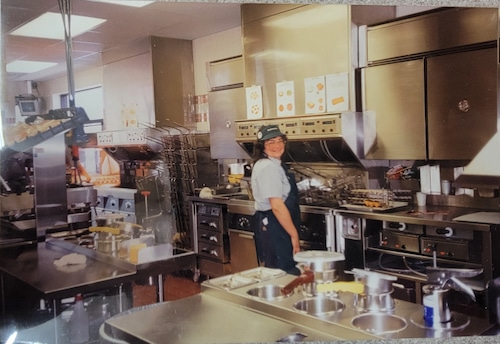On a typical day at the McDonald’s in Mifflintown, Sarah Heisey noticed a previous president standing behind the counter when she looked up. Jimmy Carter made a modest stop while fishing in 1993 while wearing casual clothing and with his wife Rosalynn and daughter Amy. It was far from routine for Heisey and her colleagues.
Heisey, who spent six-and-a-half years working at the restaurant after helping to open it in 1989, remembered the occasion clearly. He was standing there, as plain as day, when I looked up. When Carter visited the R. Wayne Harpster farm in Spruce Creek on a fishing excursion, the peaceful restaurant became a hive of activity as staff and patrons recognized him.
The Carters were dressed casually, blending in with other diners, according to a Lewistown Sentinel piece that was published soon after the visit. For restaurant manager Bob First, it was Rosalynn’s familiar presence that verified Carter’s identity. He said that she had not altered at all. The visit was even more unassuming since discreet Secret Service operatives, some of whom were also wearing fishing vests, stood discretely at the far end of the counter.
PASSED AWAY In 1989, Sarah Heisey assisted in opening the McDonald’s kitchen. One of the highlights of her stay at the restaurant was meeting and interacting with President Carter during his quiet fishing trip break.Times of Perry County
The Carters sat outside in the Playland area after placing a modest order for coffee, ice cream, and garden salads. An employee who took the order, Virginia Evans, later said the encounter left her momentarily astonished. She paused to gather herself. She acknowledged that she might not have been able to react if she had just looked up and seen them standing there.
first explained how, when Carter’s identity was revealed, the restaurant changed. It simply became a madhouse as folks recognized who it was. It was simply buzzing all over. As previously mentioned, Amy Carter spoke the most, Jimmy stayed quiet, and Rosalynn said nothing. First said, “Not a word.”
A special chord was touched by the former first lady’s interest in a McDonald’s initiative that supports staff members with impairments. Rosalynn was happy to learn of the project because it mirrored her own support of related causes while she was in the White House. The Carters were described by Evans as “very pleasant, very approachable people.”
Heisey’s enthusiasm overcame her, and she went up to Carter with a Big Mac cardboard sleeve—the only item available for an autograph. He signed it politely, to her delight. Since then, the sleeve has grown to be a treasured memento. For all these years, I had kept it in my safe. I’m hoping my son will value it rather than discard it.
METING THE CARTER The Big Mac cardboard sleeve that former President Jimmy Carter signed during his 1993 visit is carefully displayed by Sarah Heisey. The treasured memento reminds her of her chance meeting with the recently departed boss. (Photo by Paul E. Wyatt)Times of Perry County
Despite the difficulties, Heisey recalls her time at McDonald’s with pride, and her interaction with Carter is still a highlight of her time there. She received training in Harrisburg and put a lot of effort into keeping the restaurant’s high standards during inspections, but the memory of the Carters’ visit—a little moment that turned into a treasured memory—stands out the most.
Heisey considered the legacy of the man she met that day as the world grieves Carter’s death at the age of 100. He had a long and happy life, albeit his final year was not particularly nice. What a legacy he left behind, and what a lovely couple he and his wife were.
In addition to the thrill it created, Carter’s visit to Mifflintown is remembered for demonstrating his humility, kindness, and willingness to engage with regular people. For Heisey, the Big Mac sleeve represents an exceptional moment with an extraordinary guy and is more than just an autograph.

